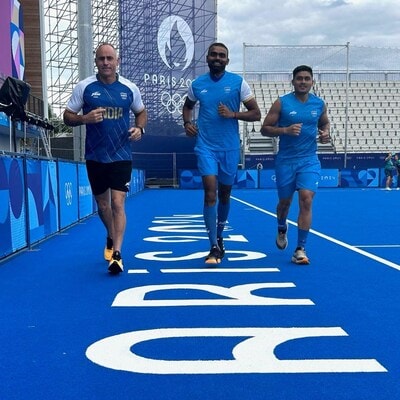[ad_1]
)
Paddy Upton with PR Sreejesh
Paddy Upton, a renowned mental guru and coach who had a successful stint with the Indian cricket team during the 2011 ICC World Cup, believes that strategies employed in sports can be effectively applied to the corporate world.
He highlights several key lessons, including the importance of overcoming constant errors, maintaining a long-term perspective, cultivating a positive culture through strong leadership and open feedback, extracting maximum effort from all team members, and being adaptable to unexpected challenges.
One of the most valuable lessons from sports is the importance of a long-term vision. Upton cites the example of India’s hockey team, which suffered a humiliating 5-0 defeat against Australia but went on to beat the same team at the Olympics just a few months later. He said, “Coach Craig Fulton deserves a lot of credit. As difficult as it was, he didn’t get caught up with winning a particular series, compromising the Olympic campaign. This is a great lesson for Indian businesses that compromise on the longer-term vision to achieve quarterly results.”
Another crucial lesson is the power of leadership. A strong leader can create a positive culture that attracts and retains top talent and inspires team members to perform at their best. Upton emphasises the importance of honest feedback and accountability in leadership, which can help identify areas for improvement and foster a more productive work environment.
He says, “Like sports teams, businesses should ask themselves what are the pieces of the puzzle—the people or systems, for example—required for success, and how to best put them together through aspects like culture and communication to lay the best possible foundation for success.”
He further adds, “One of the key pieces is great leadership because it leads to a great culture. The number one practical measure of a great culture is that it attracts the best talent. Number two is that it keeps that talent longer than any competitors. Number three is that it gets the best out of the rest.”
Upton observes that every great team in sports history typically had three to four extraordinary players. However, the importance of those who supported the star players cannot be ignored. Similarly, companies can only expect a handful of star achievers among their employees, while the majority will fall into the category of average performers. However, these employees can contribute small but significant growth rates and gains over time.
According to Upton, one of the biggest lessons companies can learn from sports is adaptability in adverse situations. Citing the example of the Indian hockey team’s great escape against Great Britain during the 2024 Paris Olympics quarterfinals, he says, “We thought through and planned for some of the predictable challenges we might face, but also knew that things may come out of left field that could not be anticipated. So, we had a clear and well-communicated plan for when it [red card] happened. Up until then, the plan was only a theory. Now, it was a case of whether we had a team with enough commitment, resilience, and grit to apply the plan for 43 minutes. This is under the highest pressure in an Olympic knockout game.”
Finally, he mentions that the one key difference between sports and the corporate world is that if a sportsperson is unhappy with the team environment, they have limited options and must make the best of the given opportunities. However, in corporate life, employees can choose to switch organisations if they are unhappy with the leadership.
Upton concludes that learning new leadership skills and replacing outdated methods will help companies evolve and encourage employees to contribute more to their own and the company’s growth.
First Published: Aug 29 2024 | 7:09 PM IS
[ad_2]
Source link

